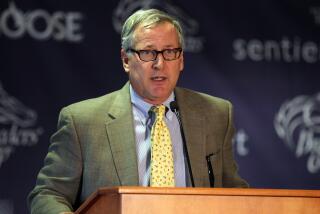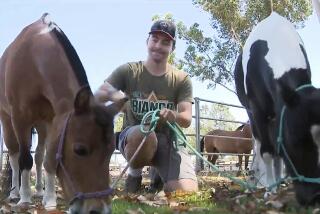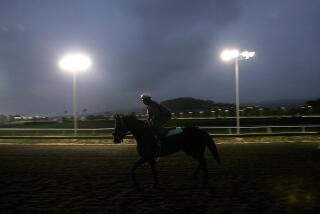Rizzo’s horse had come in
Reporting from Los Angeles and Auburn, Wash. — The lifestyle that Robert Rizzo enjoyed during his run as Bell city manager included a stable full of thoroughbreds, among them a gelding named Depenserdel’argent — French for “spend money.”
And Rizzo had plenty to spend, with an annual compensation package that swelled to $1.5 million in one of Los Angeles County’s poorest cities.
Rizzo, who resigned last month after The Times disclosed his base salary of nearly $800,000, has held title to about three dozen horses since his pay began soaring, according to thoroughbred industry databases.
FULL COVERAGE: High salaries stir outrage in Bell
He conducted his racing business through at least three firms he launched and bought a $930,000 ranch in 2004 in Auburn, Wash., southeast of Seattle, a getaway from his similarly valued home in Huntington Beach, state and county records show.
Today, his devotion to the pari-mutuel game helps bring into focus the man people say they came to know — the calculating risk-taker who has become a poster boy for government excesses.
Rizzo himself remains defiant, saying he did nothing wrong. On a recent morning at his ranch, he sought to justify his salary — the subject of civil and criminal investigations — by remarking that although it might look astounding, it wasn’t so dramatic, considering his length of service.
“Yeah, the money went bad,” he said. “But when you think about it, the 17 years I been there, that’s $250,000 a year.”
Some former and current Bell officials and business leaders, many of whom had heard only rumors about Rizzo’s equine sideline, say he increasingly displayed the manner and habits of a high-rolling horse player, with a weakness for Cadillacs, expensive cigars and alcohol.
“I always thought he was living beyond his means the last two or three years,” said Bell Chamber of Commerce President Ricardo Gonzalez. “All of a sudden, this was a person I didn’t know.”
Bell was the second posting that ended under a cloud for Rizzo. He left his previous job managing Hesperia after City Council members accused him of funneling city improvement funds to salaries, according to a former city official who requested anonymity for fear of alienating ex-colleagues. Local news reports also said he and other officials might have abused their city credit cards.
But that was 18 years ago and Rizzo, who had denied the allegations in Hesperia, began to maintain a lower profile in Bell. Colleagues say he was shy to the point of reclusiveness, hugging the wall at business mixers and avoiding speaking engagements.
Over time, by providing large salaries and other perquisites to his allies, Rizzo gambled that his huge paydays would never come under harsh scrutiny, said people who have worked with him.
With Rizzo at the helm, four of the five current City Council members were paid just under $100,000 a year for part-time duties; Police Chief Randy Adams made $457,000; and Assistant City Manager Angela Spaccia pulled down $376,000.
Rizzo’s attorney, James Spertus, said faulting his client for the salaries and perks that he and the others received is unfair because the council approved them.
“This wasn’t a Bob Rizzo fiefdom,” Spertus said.
Like Rizzo, Adams and Spaccia had lucrative benefits packages. In addition, Rizzo signed city documents that authorized loans to Spaccia and dozens of other employees, in amounts that exceeded $100,000 in some cases.
Interim Bell City Atty. Jamie Casso said his office is investigating the legality of the loans. He said he has yet to find any records that verify that the council had approved the loans or the salaries.
Under Rizzo’s leadership, in circumstances that are unclear, the city bought property owned by Mayor Oscar Hernandez and a social services organization headed by former Councilman George Cole, who is known as the political “godfather” of Bell, city and county records show.
Bell also paid $4.6 million last year for an auto-parts store owned by another ex-councilman and power broker, Pete Werrlein, who said the city got a good price, based on offers he received from retail developers.
In 2006, Bell spent more than $1 million on a law firm that employed Rizzo’s soon-to-be second wife, attorney Eugenia Chiang, during three months of that year, city records show. And he had a horse-owning partnership with Dennis Tarango, a private contractor who serves as Bell’s planning director, according to racetrack listings.
Tarango did not return calls from The Times.
Short and rotund, the 56-year-old Rizzo took to quoting tough-guy lines from “The Sopranos,” and tolerated no challenges to his expanding authority at City Hall, Bell insiders say.
“He likes to be in control,” said former Councilman Victor Bello, who told of quarreling with Rizzo over the Werrlein deal and other matters before stepping down last year.
“You don’t talk back to him — that’s the way it goes,” Bello said.
People acquainted with him through racing, however, describe a very different Rizzo. They say he is a friendly and unassuming man who cherishes his horses more than he does the modest purses they win.
“He impressed me as being a very caring person,” said Mary Lou Griffin, a Buckley, Wash., thoroughbred breeder who took on one of Rizzo’s mares, Peter’s Jewel, for foaling and raised a couple of its offspring.
Washington horse trainer Mike Chambers said Rizzo is “not flamboyant in any direction.” The two had just been out to dinner, and Chambers paid.
“You’d never know he had a cent,” Chambers said.
Bell workers say Rizzo often was kind to his subordinates, inquiring after their families, granting them leaves to tend to sick relatives and extending them city reimbursements for tuition. “He could act like he was your father,” said one employee, who requested anonymity because she does not want to be associated with Rizzo.
Others say they feel betrayed. George Bass was one of the former Bell council members who hired Rizzo in 1993, at a salary of $72,000, which the city considered a bargain.
“I don’t know what happened to the Bob Rizzo I knew,” Bass said. “I am angry.”
He said their relationship soured after Rizzo shrugged off Bass’ objections to a pending property deal by bragging that he had the other four council members in his corner. Tensions between them worsened after he cast the lone vote against a raise for Rizzo, Bass said.
Over the ensuing years, Rizzo spent less and less time on the job and grew guarded about city finances, holding fewer meetings on the budget, say Gonzalez and Werrlein.
“In retrospect, you start seeing that everything was a secret,” Gonzalez said.
Rizzo’s trips to the secluded, 10-acre ranch in Washington became more frequent, city employees and his neighbors say. The spread unfolds around a simple but elegant main house and has well-groomed paddocks and an elaborate exercise circle for the horses. It’s a short ride from Emerald Downs, where Rizzo’s steeds compete when they’re not running at Golden Gate Fields in Berkeley and occasionally elsewhere.
After a reporter knocked on the front door of the ranch house on a recent morning, Rizzo initially refused to answer, staying behind closed shutters. Then he emerged and barked, “You’re trespassing.”
A moment later, he apologized and said his lawyer had prohibited any interviews.
Standing barefoot in black shorts and T-shirt, near a knee-high jockey statue with “Rizzo” painted on it, he complained of being vilified after toiling so hard for Bell, a job he says ended his first marriage and caused him to gain 150 pounds.
“I gotta tell you, I’ve been raped by newspaper,” he said.
Rizzo’s journey to the genteel Washington countryside had its beginnings in Civil Service obscurity.
Thirty years ago, after earning his bachelor’s in political science at UC Berkeley and a master’s in public administration at Cal State Hayward, and following a stint as a $7.50-an-hour softball umpire, the Bay Area native began his career as an administrative aide in Rancho Cucamonga, where he became assistant city manager five years later. Some of his underlings there remember him as intimidating and standoffish.
“He kept to the people with position and power,” said Loyd Goolsby, who worked for the city’s building department. “He didn’t spend any time with day-to-day employees. He didn’t want people to be running up to him and start asking a bunch of questions.”
After eight years in Rancho Cucamonga, Rizzo moved to Hesperia as the newly incorporated city’s first manager, with a salary of $76,000.
“He was very impressive,” said Howard Roth, one of the Hesperia council members who hired Rizzo. “None of us had ever started a city before, and he seemed to know what he was talking about.”
Rizzo and his first wife, Sheila, settled in Hesperia with their two daughters. He scored points quickly by finding revenue opportunities for the High Desert city, former co-workers say. They recall that Rizzo had visions of turning the dusty, working-class town into a thriving center of commerce; sometimes, they said, he would court developers with rides in a sheriff’s helicopter to survey building sites.
In the beginning, Rizzo made flapjacks at community breakfasts and hosted the staff Christmas party. He also liked to golf and follow horseracing.
But Rizzo could make people bridle.
“He was pretty authoritative in his style and demeanor,” said Rob Zuel, Hesperia’s planning director at the time. He said Rizzo had persuaded the rookie council members to let him manage as he saw fit, even if it meant managing them as well, a pattern that Bell employees say would carry over to their city. “They were the sheep and he was the herder of the sheep,” Zuel said.
After a year, the council raised Rizzo’s salary to $83,750. The next year brought another bump, to $95,000. In mid-1991, Rizzo’s contract was amended so that if he was fired, he would receive up to two years of severance pay, according to city records.
But some council members eventually questioned Rizzo’s work. They suspected him of using money allocated for city improvements to finance staff pay increases, said the former Hesperia official who asked not to be named.
Rizzo subsequently resigned, signing an agreement that paid him more than $108,000 over nine months for consulting services and required him, his wife and the council members to keep the terms confidential, city records obtained by The Times show.
“He received an exorbitant amount of money, and in my opinion, it was a gift of public funds,” said Gene Helsley, former president of the Hesperia Chamber of Commerce.
An audit of the city’s finances reported that more than $7 million in unspecified transactions had not been fully documented during Rizzo’s administration and that restricted funds had been used for general fund operations.
Rizzo painted a different picture of the events leading to his departure. In a 1993 deposition given for a federal lawsuit filed by a former city employee, Rizzo said he was punished because the council had resisted adopting modern standards of city governance, such as strict code enforcement. He also said he had received death threats.
“I knew the council could be vindictive, very, very vindictive. So I basically said…’I need to get out of here,’” Rizzo added in the sworn statement. “This place just is — you know, has driven me to the wall. I can’t do any more here.’”
Seventeen years later, Bass, the former Bell councilman, said he regrets that he and his fellow council members did not look more carefully into Rizzo’s professional background before hiring him.
In his application letter, Rizzo wrote, “The city of Bell is of particular interest to me because I have the experience and ability to work with the City Council and community to continue the city moving positively toward the next century.”
The letter highlights his service in Hesperia, with no mention of any dispute with the council.
“We didn’t know about those specific problems,” Bass said.
Rizzo fit in nicely in Bell, winning praise from his elected bosses for righting the cash-starved city’s fiscal course by restructuring bonds that teetered on default and taking other measures to firm up the bottom line. He seeded youth programs and kept the parks spruced up. And he embarked on an ambitious program of buying properties through city housing and redevelopment authorities, with the stated goal of improving them.
Some of the purchases now raise questions. One in particular, a bond-financed acquisition in 2006 of land near the 710 Freeway, has proved ill-advised because the city can’t afford to pay off the $35-million debt, The Times has reported.
According to Bass and Werrlein, Rizzo also became a friend of Bruce Malkenhorst Sr., who made more than $900,000 in 2005 as Vernon’s city administrator and has been indicted on charges of misappropriating public funds.
Malkenhorst, who has pleaded not guilty, said in an interview that he had not talked to Rizzo much in the last four years or so. “Who’s to judge?” he said when asked about the criticism of Rizzo’s pay.
He said that the two mainly saw each other at golf tournaments and that Rizzo had not sought his advice on Bell’s finances. “Bobby had his own ideas on what to do,” Malkenhorst said.
Bass, a retired Vernon fire chief who had clashed with Malkenhorst over labor policies there, said he did not like it that Rizzo socialized with his fellow city boss. “I was still close to Bob then, and my constant recommendation to him was to stay away from Bruce Malkenhorst,” Bass said.
Until his salary became public, Rizzo continued to dominate his city. At ex-Councilman Cole’s urging, former and current employees say, Rizzo helped the city stage a successful election — barely 400 of Bell’s 40,000 residents voted — to transform the town from a general law municipality into a charter city. The election was scheduled soon after a 2005 state law capped council salaries for general law cities.
Council members have denied that pay had anything to do with the election, but their salaries shot up after the switch to charter status, and Rizzo’s employment contracts ballooned. Casso said available city records indicate that Rizzo’s salary was divided among several titles he held, such as head of the housing and public finance authorities; no single giant figure appeared under the city manager designation. Spertus said he believed the council and a former city attorney opted to structure the pay that way.
Meanwhile, Rizzo divorced Sheila in 2001 and married Chiang six years later. The 35-year-old Chiang, who did not respond to interview requests, started a marketing company in 2007, with Rizzo serving as secretary, state records show. The couple have a young daughter.
Rizzo’s horseracing interests kept pace. Auburn neighbors say he runs his horses in Washington and Berkeley because the stable fees were too steep at closer-to-home Santa Anita and Del Mar.
At Emerald Downs, track officials and trainers said Rizzo has generally bought relatively inexpensive horses. Listed as the owners of most are three California companies he has formed — Rizzo Racing Stable Inc., R.A. Rizzo Inc. and Golden Aggie Ranch Inc., according to Bloodstock Research Information Services and Equibase Co., databases on racing.
It could not be determined how much he has spent on his thoroughbreds, because many sales are private. From 2004 through this month, Equibase figures show, the horses owned by Rizzo’s firms have collectively earned about $678,000, less than half his total take in Bell this year.
Folks who know him from the pastures of Auburn and the races at Emerald Downs say he loves his sojourns there and dotes on his horses almost as much as he does on his wife and daughters.
“He’s very much a homebody,” said Donna Rose, who runs a bed-and-breakfast down the road from the Rizzos in Auburn. “He is a very nice man that puts his family in a position of big importance.”
In March of this year, Rizzo’s life away from Bell City Hall took a bad turn. He was arrested in Huntington Beach on suspicion of drunk driving. Police say he had a blood-alcohol level of 0.28%, 31/2 times the legal limit. He has pleaded not guilty, and a counselor informed the court that Rizzo has been in treatment for alcohol abuse.
The pending DUI case charted a downward trajectory. Four months later, after his salary made headlines, Rizzo announced his retirement in the face of a public outcry. Investigators soon were seizing records at City Hall. A former Bell police sergeant sued the city around the same time alleging he was forced out for complaining about election fraud and other official misconduct on Rizzo’s watch.
In his suit, James Corcoran further claims that a secretary told him she had been sexually assaulted by a drunken Rizzo. Corcoran accuses city officials of trying to cover up the alleged assault, which purportedly occurred 10 years ago. Former city employees say Rizzo denied the allegations. Casso said he could not comment on the suit because he hasn’t seen it.
Spertus said Rizzo wants to put the uproar in Bell behind him and reach a severance agreement with the city. He said his client should be cleared by the pending investigations.
“Is he in jeopardy? To me, on the merits, no,” Spertus said. “But in the court of public opinion, yes. That’s because of the witch hunt that is now unfolding.”
paul.pringle@latimes.com
corina.knoll@latimes.com
kim.murphy@latimes.com
Times staff writer Hector Becerra contributed to this report.
More to Read
Sign up for Essential California
The most important California stories and recommendations in your inbox every morning.
You may occasionally receive promotional content from the Los Angeles Times.












